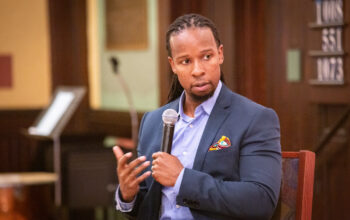When the virtues necessary to sustain careful consideration of the common good are not present in society, self-government becomes impossible.

It is the nature of a democratic society to have grave disagreements over the best course of action to pursue in the affairs of government. In any large polity, there will be many different perspectives on the nature of government and the principles which ought to regulate social conduct. In many cases, the difference of opinion is very difficult to resolve, and may produce feelings of the utmost violence among its partisans on either side. If such a society and government is to be long in continuance, the citizens must be possessed of the ability to engage in civic discourse. Without this, it will hardly be equipped to weather those disputes of great import which arise in the course of every government, and must either fail or, in making a resolution, lapse into tyranny.
Civic discourse is the art or virtue of considering the merits of arguments in a reasonable manner, in order to come to a more certain conclusion of the correctness of both. Accordingly it is very different from debate and rhetoric, whose objects are to persuade and to motivate rather than to reason. Debate and rhetoric are also very important to a self-governing people, but they cannot exist substantially unless there is a robust civic discourse to support them; otherwise they degenerate into sophistry and demagoguery.
Civic discourse is both a public virtue, possessed by a society as a whole, and a personal one, possessed by individuals. The personal virtue is necessarily prior to the public one; a society possessed of the ability to support civic discourse must be made up of citizens who are capable of engaging in it. The personal virtue of civic discourse rests primarily on two preceding virtues: first, on a high regard for truth and reason, and second a sense of humility. When these virtues are combined, no amount of flattery or appeal to partisanship or interest can dissuade a citizen from thoroughly examining a matter, and no enticement will persuade him to resort to dishonest attacks or sophistry in order to carry a point. A sense of public spirit and responsibility will prompt him to educate himself in the affairs of his society, and to establish it upon the best and most correct grounds, although this may be of considerable difficulty to determine and enact.
The capacity for engaging in civic discourse is founded upon a high regard for truth. In the public sphere, there are any number of motivations for action: fame, power, remuneration for oneself or one’s friends, the promotion of a favored cause, and so forth. When discussing the merits of any matter, then, the quality of the arguments will be finally determined by the respective motivations of the participants. A citizen who regards the welfare of his financial interests as the end of his political participation will bring forth arguments not designed to illuminate the ultimate truth of a matter, but to cast it in such a light as to promote his own interests. However, the citizen who wishes to know the true and best course of action will follow reason to its end, even though it is contrary to his own interests, or critical even of that which he holds dear. In sum, he will be willing to pursue the common good of the community even at his own expense.
Civic discourse requires that citizens be willing to put the common good of the community above their own interests or pride.
As such, although he will present his own opinion as strongly as he may, and although he will object to any reasoning which seems faulty as strenuously as possible, he will accept sensible arguments even if he does not care for their conclusions. Rather than attempting to cover or conceal flaws in his own arguments, he will admit them and acknowledge those areas in which his opponent is correct. Nor will he be afraid to have his mind changed by such a discussion; and if he is honest, he will recognize that he has learned and his opinion has become more completely formed, even if he has not found his counterpart’s argument entirely meritorious.
Humility is the second virtue necessary to sustain civil discourse between individuals. Humans are naturally vain and self-centered, and it is a difficult thing for most people to admit fault. A question of policy becomes a field of battle, and he who admits an opponent’s point, whether wrong or right, is considered to have suffered a loss. It is not uncommon to hear people speak of losing an argument as though it were a blot on their personal character, or to speak of winning one as though they had proved their superiority over their opponent, without considering at all whether the points put forth by either side were reasonable or not. It is also hard to think of the last time any political candidate admitted that they had learned something new, or considered a topic from a different point of view and therefore changed their position. Indeed, when people do change their political ideas, they are often accused of being inconsistent rather than intelligent.
Humility includes both a willingness to admit that one’s understanding is fallible and liable to being reexamined, and knowing that a disagreement is not a personal attack. If I recognize that I am only a human being, and that my ideas are probably incomplete in many ways, I will not be afraid to admit that I have been wrong. On the contrary, I will do so willingly so that I can learn and move forwards. While not everyone will respond to it, this approach will often prevent political discussions from becoming exercises in one-upmanship- for nothing is as agreeable or friendly as hearing someone admit that you have taught them something and changed their mind. What could have been a contentious argument becomes a respectful discussion, with both sides honestly critiquing each others’ points of view, as people are usually willing to reciprocate when others respect them and value their opinions.
Civic discourse is a civic responsibility as much as voting is. It is a part of the process of becoming an educated citizen- to be able to respectfully and productively exchange ideas and build an understanding of political affairs. The lack of this virtue has dissuaded many people from participating in politics completely, as they not unreasonably find the contentious and even sometimes vicious political discussions that are common to be unpleasant and unproductive. As such, promoting civic discourse in society is something of the highest importance: to increase both the political understanding of those citizens already engaged in politics, and to persuade the others to participate in a process so vital to their own interests and those of the society in which they live. It is a small part of creating the quality of citizens so necessary to a self-governing society- those who are willing to put the good of the commonwealth above their own, even if it be only in a discussion of political matters.




